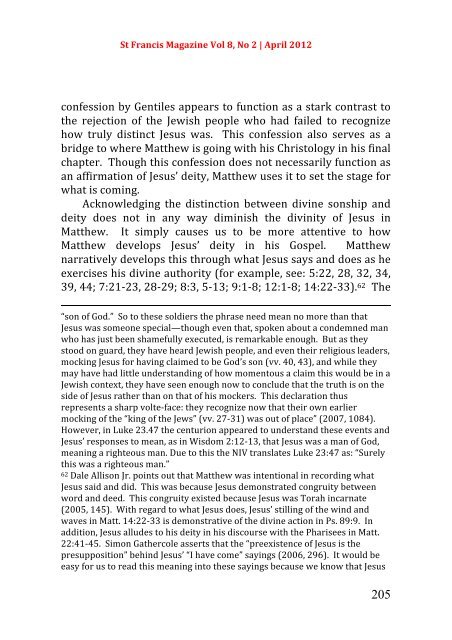Untitled - St.Francis Magazine
Untitled - St.Francis Magazine
Untitled - St.Francis Magazine
You also want an ePaper? Increase the reach of your titles
YUMPU automatically turns print PDFs into web optimized ePapers that Google loves.
<strong>St</strong> <strong>Francis</strong> <strong>Magazine</strong> Vol 8, No 2 | April 2012 confession by Gentiles appears to function as a stark contrast to the rejection of the Jewish people who had failed to recognize how truly distinct Jesus was. This confession also serves as a bridge to where Matthew is going with his Christology in his final chapter. Though this confession does not necessarily function as an affirmation of Jesus’ deity, Matthew uses it to set the stage for what is coming. Acknowledging the distinction between divine sonship and deity does not in any way diminish the divinity of Jesus in Matthew. It simply causes us to be more attentive to how Matthew develops Jesus’ deity in his Gospel. Matthew narratively develops this through what Jesus says and does as he exercises his divine authority (for example, see: 5:22, 28, 32, 34, 39, 44; 7:21-‐23, 28-‐29; 8:3, 5-‐13; 9:1-‐8; 12:1-‐8; 14:22-‐33). 62 The “son of God.” So to these soldiers the phrase need mean no more than that Jesus was someone special—though even that, spoken about a condemned man who has just been shamefully executed, is remarkable enough. But as they stood on guard, they have heard Jewish people, and even their religious leaders, mocking Jesus for having claimed to be God’s son (vv. 40, 43), and while they may have had little understanding of how momentous a claim this would be in a Jewish context, they have seen enough now to conclude that the truth is on the side of Jesus rather than on that of his mockers. This declaration thus represents a sharp volte-‐face: they recognize now that their own earlier mocking of the “king of the Jews” (vv. 27-‐31) was out of place” (2007, 1084). However, in Luke 23.47 the centurion appeared to understand these events and Jesus’ responses to mean, as in Wisdom 2:12-‐13, that Jesus was a man of God, meaning a righteous man. Due to this the NIV translates Luke 23:47 as: “Surely this was a righteous man.” 62 Dale Allison Jr. points out that Matthew was intentional in recording what Jesus said and did. This was because Jesus demonstrated congruity between word and deed. This congruity existed because Jesus was Torah incarnate (2005, 145). With regard to what Jesus does, Jesus’ stilling of the wind and waves in Matt. 14:22-‐33 is demonstrative of the divine action in Ps. 89:9. In addition, Jesus alludes to his deity in his discourse with the Pharisees in Matt. 22:41-‐45. Simon Gathercole asserts that the “preexistence of Jesus is the presupposition” behind Jesus’ “I have come” sayings (2006, 296). It would be easy for us to read this meaning into these sayings because we know that Jesus 205







![Reflections on Surah Fatiha and the Lord's Prayer[1] - St.Francis ...](https://img.yumpu.com/49377951/1/184x260/reflections-on-surah-fatiha-and-the-lords-prayer1-stfrancis-.jpg?quality=85)








